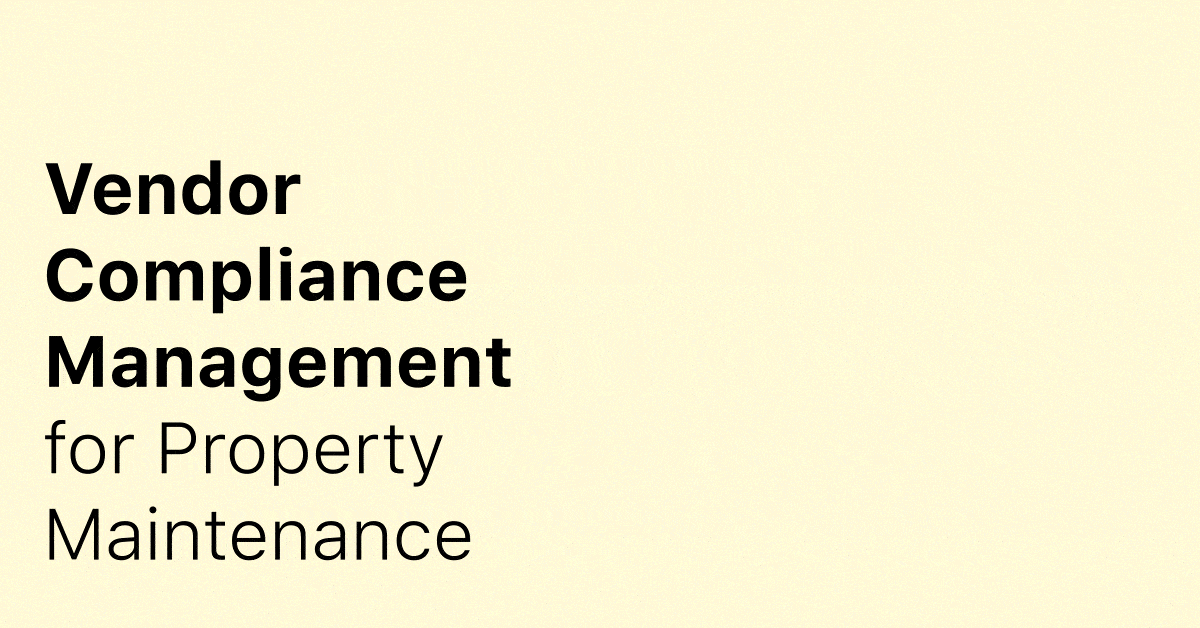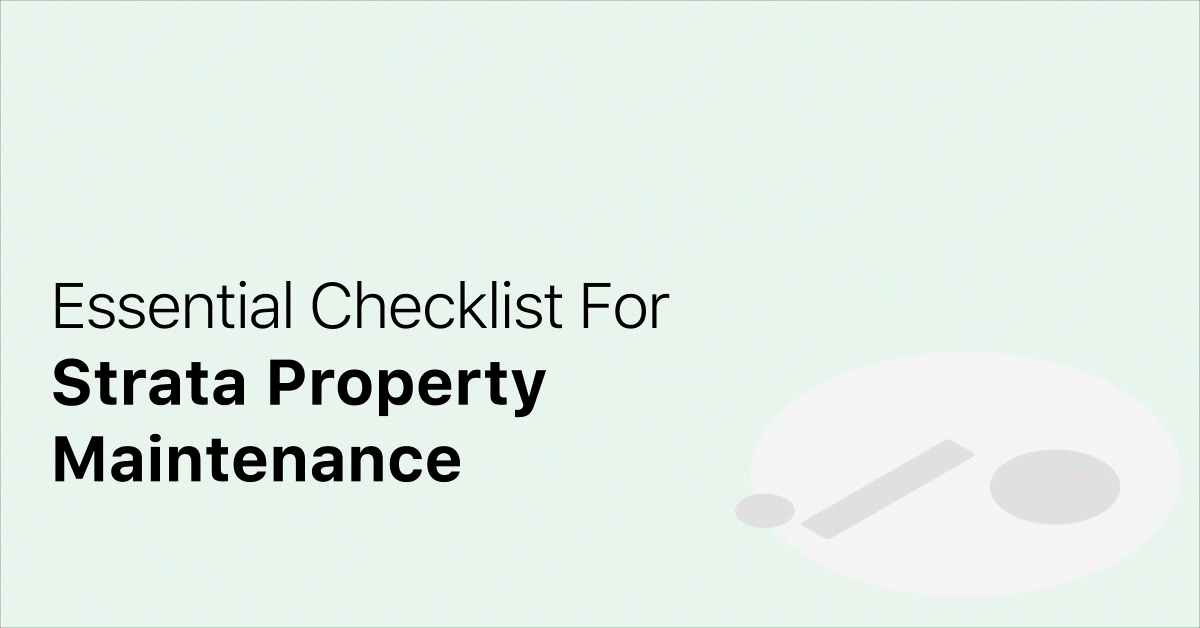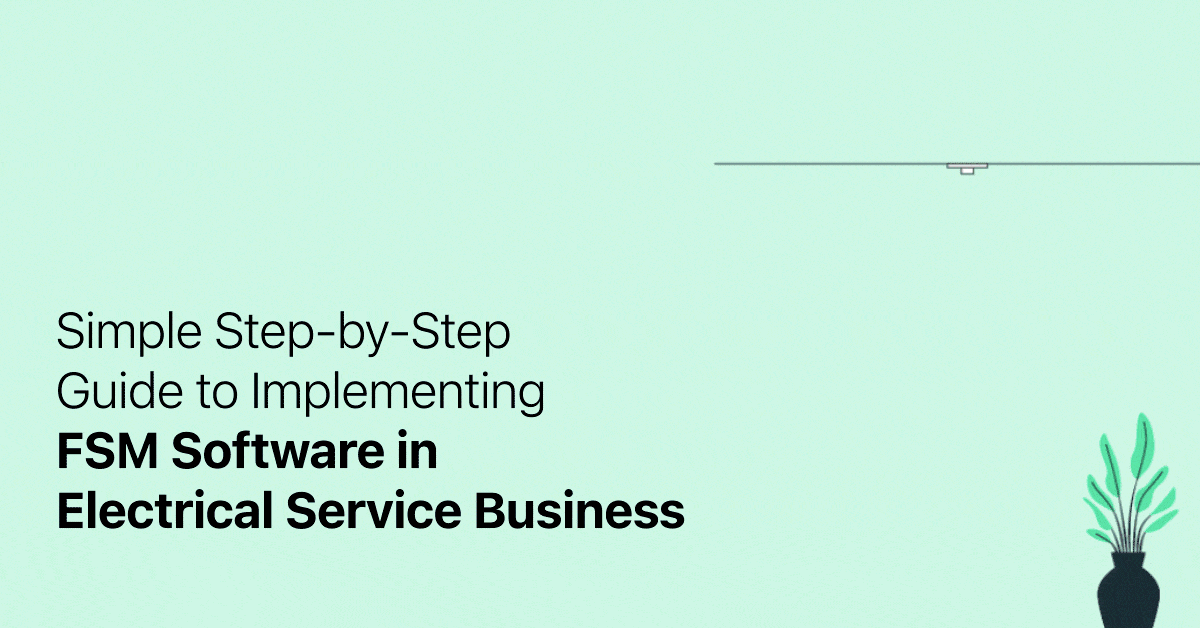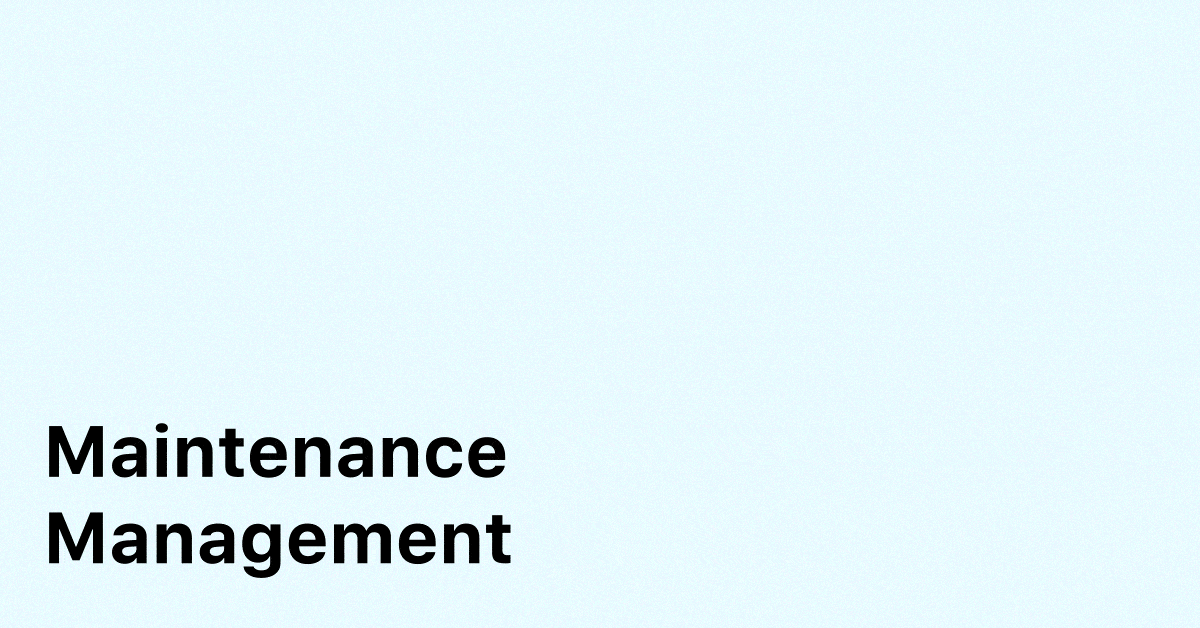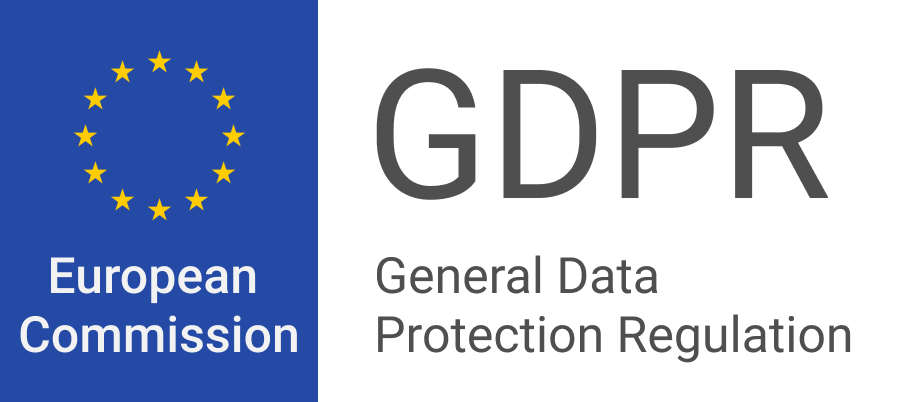Would you let a tenant move in without running a vigorous background check? Then why do business with a vendor who hasn’t been thoroughly vetted? Vendor compliance management lets you do just that!
Vendors for Property Management Companies, whether its high-rise apartments or condos, are suppliers that provide property maintenance services. These services include landscaping, plumbing or electrical work, roofers, handymen and many more.
Vendor compliance plays a vital role in property management. Doing so ensures your tenants and properties are safe and your landlords are satisfied. It also helps you avoid getting your business into legal trouble down the line.
What is vendor compliance management and how does it work?
It is the process of carefully choosing and monitoring Field Service Suppliers to maintain your real estate portfolios.
Vendor compliance involves a set of policy expectations that must be fulfilled under all circumstances. Property managers need to ensure compliance by putting in place:
- Risk assessment
- Regular performance evaluations
- Creating contacts
- Carrying out continuous oversight of work
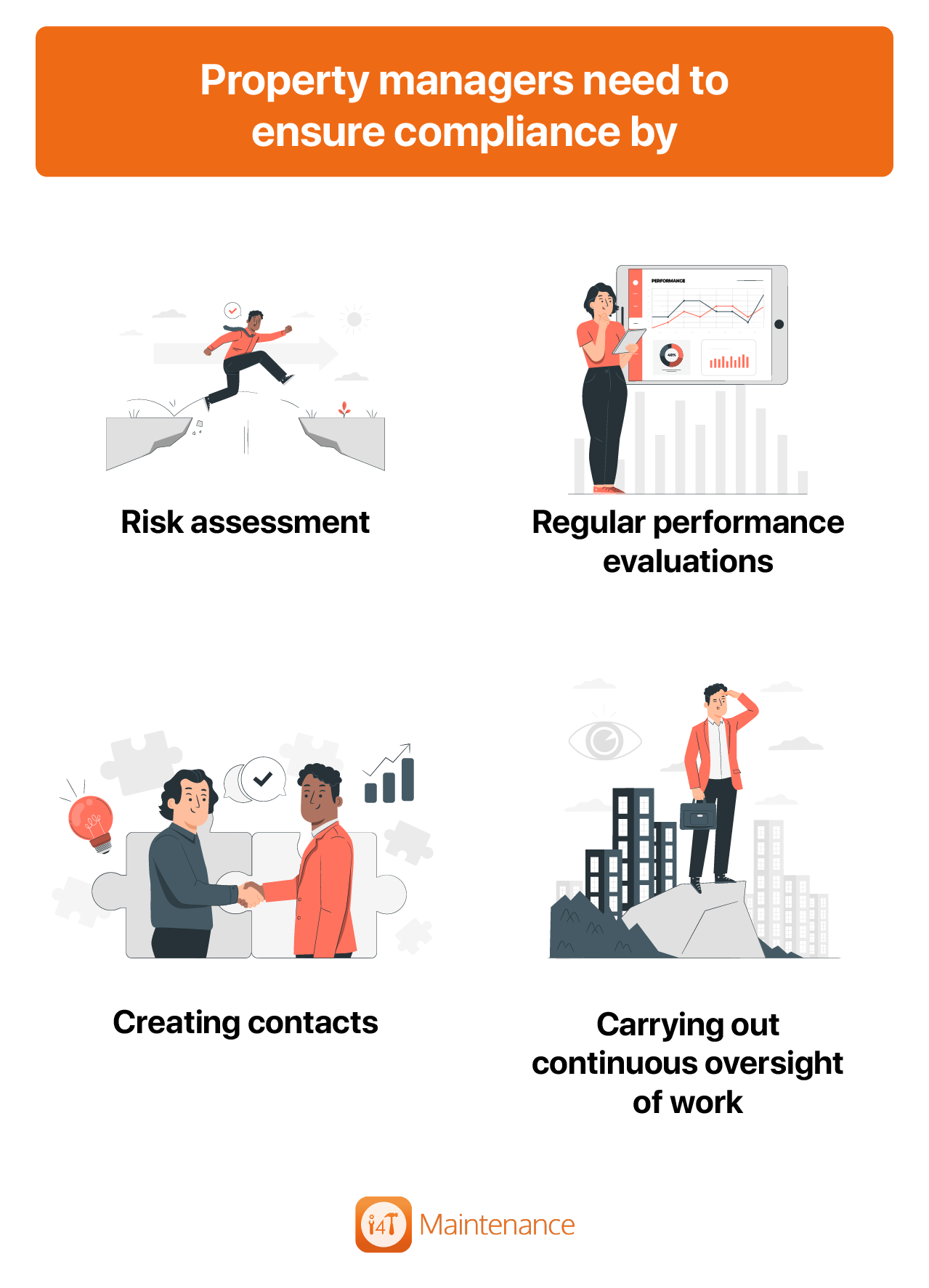
For property managers, vendor compliance may not be on top of their minds. This may be because resolving tenant and landlord issues take over priority on most days. However, when Vendor Compliance is not carried out, it can cost businesses millions of dollars. These costs can result from lawsuits, inefficient operations, low ROI, reputation loss and customer satisfaction.
Managing the cycle of vendor compliance with the right vendor relationship management process can prove to be a very fruitful strategy. This is especially true for property managers handling large portfolios.
How do policies and procedures contribute to managing regulatory compliance in property management?
A property management company’s policies and procedures are important for a number of reasons. However, its most basic and vital purpose is to meet standards of an effective compliance program.
Design, completeness, easy access, integrity of operations and controls of policies and procedures all play a crucial role here.
A well outlined policies and procedures documents:
- Ensures all parties involved understand the risks when not complying.
- Adds a culture of compliance to the day-to-day operations of a business.
- Provides training on identifying discrepancies and facilitates communication to report misconduct.
- Makes room for properly scoped investigations by qualified personnel and ensures accountability measures are taken.
- Carries out risk-based due diligence for third-party on-boarding. Also puts controls in place, manage relationships and lay out consequences of not complying.
Responsibilities of a risk and compliance manager
Today, we live In a world where you could be sued for the smallest deviation from the contract. This makes mitigating risk a top priority for businesses. In this respect, Property maintenance companies are no different.
Vendor compliance managers play a vital role in keeping tenants safe and increasing the company’s ROI. They also ensure work orders are completed as per the guidelines. Finally, it’s important that all legal and policy requirements are met according to the contract.
In general, the responsibilities of a risk and compliance manager for a property management company involves:
- Screening of vendors to ensure they have the right licences and certificates to carry out work on their properties. Licences need to be renewed in most cases so validity of these licences needs to be monitored on an ongoing basis.
- Is your vendor giving out work to subcontractors? A risk and compliance manager needs to know exactly who will be working on their properties.
- Checking a business’ financial stability. This ensures that there won’t be any hindrance starting or continuing a relationship with the vendor.
- Thoroughly checking the background of the vendor as well as their employees. Checks should be carried out for police records or possible licence suspensions in the past.
- Verifying the validity and extent of their insurance coverage at the time of the contract. Check it on an on-going basis. This ensures that it was not modified days, weeks or months after the contract was signed.
- The vendors have a proven track record of delivering quality service for similar properties.
Once hired managing compliance becomes an on-going process that:
- Regularly audits work orders to ensure work is completed as per the set guidelines. This prevents vendors from falling into complacency mode.
- Maintain strong communication with the vendors to set clear expectations. Also, timely inform them of any changes in the rules or regulations and any change in their roles.
- Keep assessing vendor capabilities such as capacity to deal with growing numbers of orders and their financial stability over time.
Vendor compliance requirements checklist
Vendors are an integral part of a property maintenance business. However, your business may be subject to the risk of not complying if you do not have policies in place.
Here is a complete checklist for you to create the right policies. It will also set the expectations straight in your vendor contract, right from the start.
- Get management buy-in for vendor compliance: Make sure all key stakeholders understand the risk of not complying. Also important is to get their support in terms of resources to create and fund a vendor compliance management system.
- Determine specific industry requirements: Find out which vendor compliance requirements apply to the property maintenance management industry.
- Develop policies and procedures related to the vendors: Carryout due diligence and chargeback schedule for not complying. Your policy should also mention procedures for contract termination and vendor compliance implementation guidelines.
- Practice formal risk-assessment: Consider due diligence for vendor selection process, risk ranking potential threats and mitigation strategies.
- Create an on-going vendor management procedure: Do you have the right documents, workflows, software, metrics and reporting system in place? It will help you with tracking vendor performance.
- Finalise the vendor contract: Outline all expectations and obligations from your vendor. Mention scope of relationship and performance standards. Dispute resolution, payment and compensation for service delivery are also important. Consider adding channels of communication and termination rights for each party.
- Monitor Compliance: Delegate personnel to monitor performance and create audit reports to identify and mitigate potential risks.
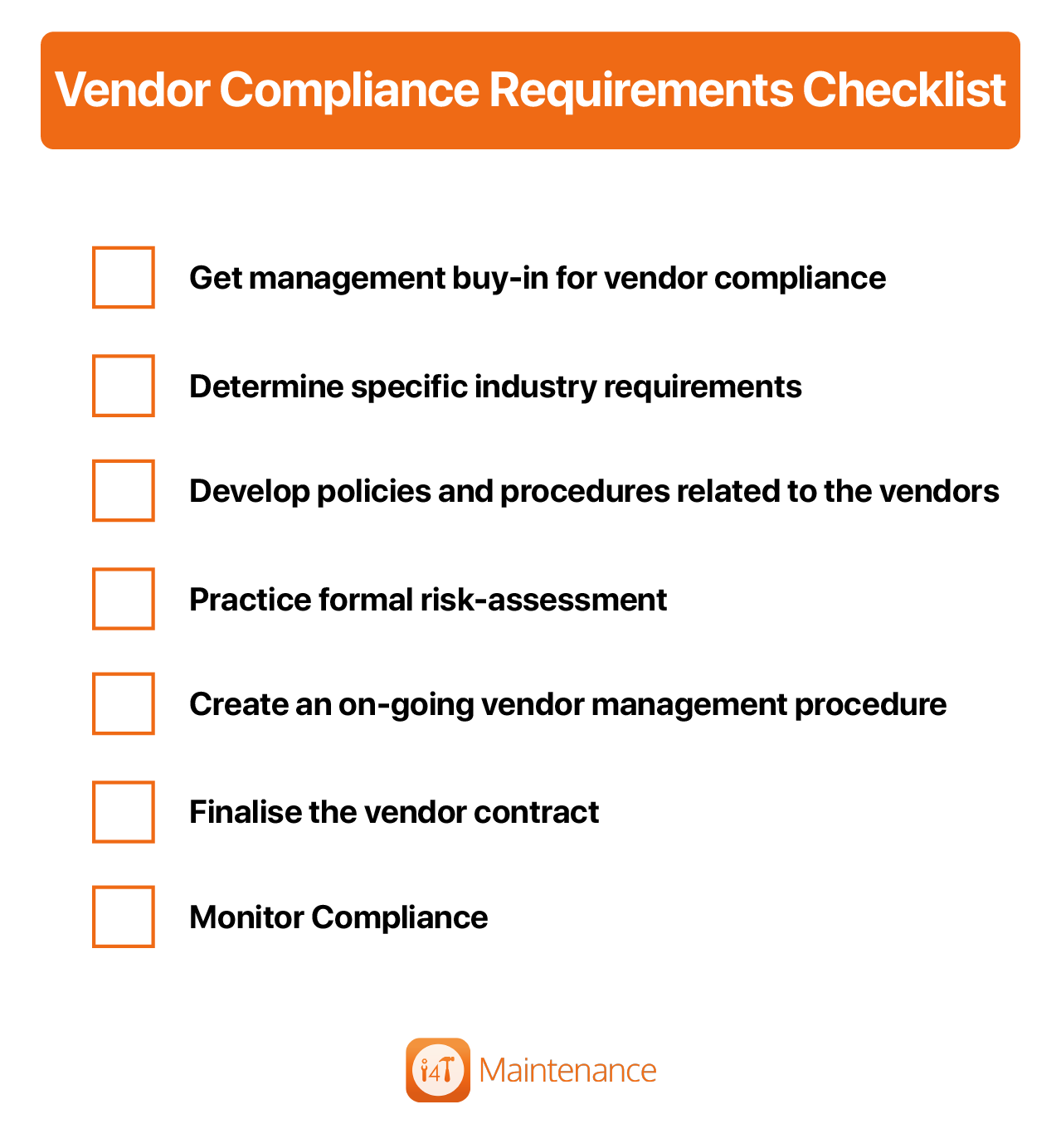
What is a vendor compliance management system
A vendor compliance management system is a set of integrated tools, documents, processes and controls. These are put in place to mitigate the risk associated with working with a third-party service provider.
When done right, the system makes it simpler for a property management company to comply with the regulatory requirements. This, in turn, helps protect the rights of owners and occupants.
Steps to create a vendor compliance management system
Managing vendor relationships is becoming increasingly important for Property managers, if they wish to keep landlords and tenants happy.
A company wide vendor compliance program is needed in order to select and manage your vendors better.
Following are the steps needs to create an effective vendor compliance management system:
1. Conduct a risk assessment
The cost of not complying can be huge for businesses to handle. In order to understand what compliance measures need to be taken, it’s important to first consider the cost of not complying.
To do this, it is a good practice to itemise the benefits of hiring particular vendors. Consider liabilities associated with each vendor. Calculate costs in terms of charges and the financial implications of creating a third-party management position in your organisation.
2. Evaluate your vendors
As already mentioned, evaluating vendors is highly critical before you sign a contract with them. The compliance manager should look at their financial history, reputation, credibility, licences, background, insurances, certification, responsiveness and service quality.
Also worthwhile, is to look at their subcontractors and check and evaluate them on the same metrics.
3. Create a Vendor Compliance Policy
Your vendor compliance policy is based on your particular business needs and your industry. Your policy should have the following elements:
- List down what you need to accomplish based on your company priorities and the role you want the vendors to play.
- List down your service delivery standards and guidelines that need to be followed in order to accomplish your outlined goals.
- Take into consideration the vendors you are working with. Make sure your policies don’t make it impossible for anyone to work with you.
- Penalties or charge backs in case there is a policy violation should be outlined.
- Get the vendors to read and agree to your policy before they sign it and start doing business with you.
4. Sign a vendor contract
As a property manager, you need to have separate vendor contracts for each of your properties. This will ensure your specific goals and guidelines from owners are met, while your general policies are also implemented.
The contact should also include:
- Scope of responsibilities of each party
- Response times and availability
- Payment terms
- Performance standards
- Audit standards
- Dispute resolution
- Contract renewal and termination
- Loss compensation and liability clause
5. Get everything on a vendor management system
The above mentioned steps should be followed to get your vendor compliance management programme up and running. Once the vendors are onboard, their performance also needs regular monitoring and reporting.
In this context, a vendor management system plays a vital role in continuing third-party oversight. This ensures policy alignment on an on-going basis.
Automated vendor management systems are great to ensure compliance with tools that helps with checking:
- Licence and certificate validation
- Track changes to insurance coverage
- Monitor financial conditions
- Generate audit reports
- Oversee customer interactions
i4T Maintenance, helps property managers ensure that their vendors are licensed and certified. It also records progress of all work orders in real time to ensure compliance with service delivery standards.
Wrapping thoughts
Policies and procedures play a vital role in paving the ground for vendor compliance. However, effective vendor risk management needs to fill a few more gaps.
From due diligence when on-boarding vendors to senior management buy-in, you need to put a solid contract in place. Vendor risk-ranking along with on-going oversight of their performance are crucial elements of a good vendor compliance management system.
Hot off the press!

With our cutting-edge technology and in-depth knowledge of how the Field Service Management sector operates, the i4TGlobal Team loves to share industry insights to help streamline your business processes and generate new leads. We are driven by innovation and are passionate about delivering solutions that are transparent, compliant, efficient and safe for all stakeholders and across all touch points.

